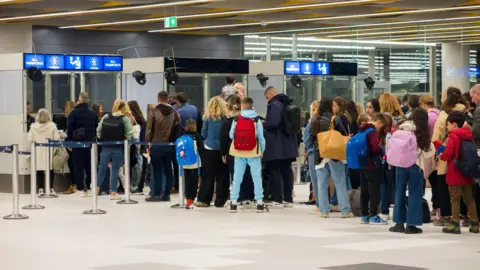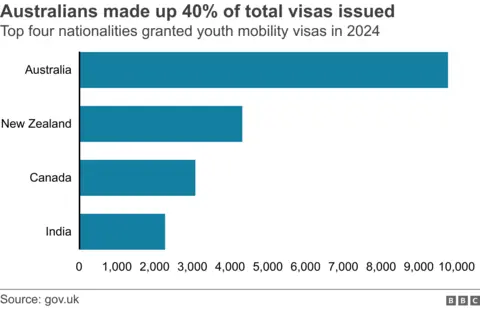Five unanswered questions in UK-EU deal
 Alamy
AlamyThe UK and the European Union have agreed a major new deal covering areas including trade, defence, fishing and energy.
However, negotiations are still taking place on a number of key issues - leaving some important questions unanswered.
How much will the UK pay?
The deal makes several references to a "financial contribution" from the UK to access certain benefits, notably an agreement to reduce checks on food exports to the EU.
The prime minister's official spokesman said these were "administrative costs".
He insisted they would not be "big" but refused to put a figure on how much the UK would pay.
In other areas, terms are still being negotiated so the cost to the UK isn't known yet.
For example, the two sides are working towards the UK rejoining the Erasmus+ exchange programme, which allows students to study or do work placements abroad.
Rather than simply covering administrative costs, the UK would be expecting to get direct benefits in return and the government has said it will only take part "on significantly improved financial terms".
How many people will benefit from youth visa scheme?
The UK has agreed to work towards a "youth experience scheme" with the EU, which would allow young people from the bloc to apply for a visa to live and work in the UK and vice versa.
The government has said any such deal would be "capped and time-limited" but it has not specified how many visas could be issued annually and how long they would be valid for.
These details will be the subject of future negotiations.
The UK already has similar schemes with 11 countries including Australia, New Zealand and Japan, with people able to stay for up to three years depending on which country they are from.
Last year, just over 24,000 youth mobility visas were issued by the UK.

When can British travellers use e-gates?
Since Brexit, British travellers at EU airports have generally been forced to have their passport stamped at manned desks, rather than use automatic gates with facial recognition technology.
Some airports already allow British passport-holders to use e-gates - but for those that don't the only alternative is often a lengthy queue.
The deal states that there will be "no legal barriers" to Britons using e-gates when travelling to and from EU countries after the introduction of the European Union Entry-Exit System.
The long-awaited digital border checks system is due to replace passport stamping for travellers from outside the EU in October.
Prime Minister Sir Keir Starmer has said UK holidaymakers will want to get away "without delay" this summer and he wants them to be able to use e-gates "as soon as possible".
But it is up to individual EU countries to decide whether British passport holders can use e-gates at their airports.
So whether this will be possible in more countries by the summer holidays is unclear.
Will it be easier for British bands to tour Europe?
Since Brexit, British musicians have faced extra costs and red tape when touring Europe - and stars have long called for action to tackle this.
Labour's general election manifesto last year pledged to "help our touring artists" as part of negotiations with the EU.
But the deal agreed on Monday only recognises the "value" of touring artists and promises to continue efforts "to support travel and cultural exchange".
The UK says it will explore "how best to improve arrangements for touring across the European continent".
Tom Kiehl, chief executive of UK Music, which represents the industry, welcomed this as "an important first step" but said the sector was seeking "more concrete commitments".
 EPA
EPAWill UK qualifications be recognised in the EU?
Another promise in Labour's manifesto was to "secure a mutual recognition agreement for professional qualifications to help open up markets for UK service exporters".
This would mean professionals - such as doctors, lawyers, accountants and architects - who qualified in one country could practice in another with minimal extra bureaucracy.
EU citizens already have the right to do this across the bloc.
Such an agreement would make it easier for British companies to move staff between the UK and EU and undertake short-term work in Europe.
However, there may be less incentive for the EU to reach a deal on this, given that the current situation makes it harder for UK firms to compete for business in Europe.
Monday's deal only promises to set up "dedicated dialogues" on the recognition of professional qualifications.
A full agreement in this area could take much longer to negotiate, if the EU will sign up to one at all.

Sign up for our Politics Essential newsletter to keep up with the inner workings of Westminster and beyond.
